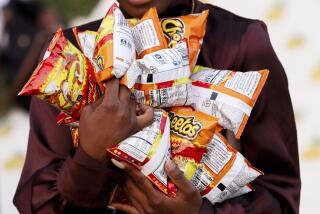Schools Are Urged to Scrap Junk Food
- Share via
WASHINGTON — A national consumer group targeted school vending machines Monday as one of the links to obesity in children and urged school districts nationwide to replace candy, soda and other junk food in the machines with healthier options.
The Center for Science in the Public Interest said the offerings commonly found in school vending machines have taken the place of fruit, vegetables and other more nutritious alternatives among school-age children.
“Too many of our nation’s schools are selling soda pop, imitation fruit drinks, chips, snack cakes, candy and cookies to our kids through vending machines, school canteens, snack bars, fund-raisers and a la carte lines,” said Margo Wootan, director of nutrition policy for the nonprofit group.
Unlike school breakfasts and lunches that follow nutritional standards set by the U.S. Department of Agriculture, the vending machines -- though prohibited by federal law in cafeterias during mealtime -- are not subject to the same level of federal scrutiny, Wootan said.
The absence of federal regulation has led to vending machines lining school corridors, making unhealthy snacks readily available to children, Wootan said.
But some critics in the soft drink industry said the center is focusing on only a small piece of the puzzle of how to make kids healthier.
An understanding of nutrition and an emphasis on physical activity will teach children how to live a healthy lifestyle more than “putting into place restrictive food policies in schools,” said Sean McBride of the National Soft Drink Assn.
“[We need] to find ways to improve and bolster nutritional education,” McBride said. “If you’re leading a balanced lifestyle, you can have some refreshment in your daily routine.”
In the last 20 years, obesity rates have doubled in young children and tripled in teens, increasing their risk of future ailments such as heart disease, diabetes and cancer, according to data from the center.
Soda consumption by children increased by 40% between 1989 and 1996, and on average a child consumes 30 pounds of sugar from soda each year.
“Kids are eating more calories [and] are more overweight,” Wootan said, and these are “calories that many kids can’t afford.”
The center is lobbying for healthier options, such as granola bars, raisins, fruit cups and bottled water, to replace junk food in vending machines at schools.
Currently, 15 states have efforts underway to improve food offerings in schools, from negotiating healthier vending machine food contracts to adopting a zero-tolerance policy toward junk food.
Los Angeles Unified School District administrators last year voted to ban soft drink sales during school hours. Each school has until January to make the change.
“We shouldn’t be the ones selling the products that we all agree isn’t very good for kids,” said Andrew Glazier, spokesman for Marlene Canter, the Los Angeles school board member who spearheaded the ban.
Reaction among students in Los Angeles schools predictably has been mixed, Glazier said, but those who support the decision to empty all campuses of soda have been vocal.
More to Read
Inside the business of entertainment
The Wide Shot brings you news, analysis and insights on everything from streaming wars to production — and what it all means for the future.
You may occasionally receive promotional content from the Los Angeles Times.










